VARIOUS ARTISTS / “Prison Work Songs Mixtape”
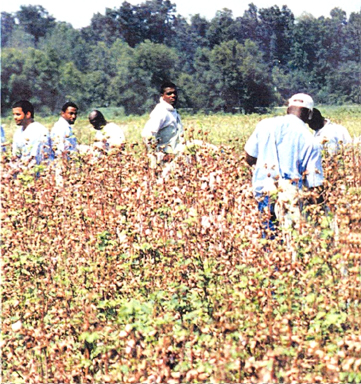 The United States has the largest prison population in the world—yes, even larger than China, a country whose population is much larger than the population of the United States. Why? Why should the richest country in the world have the largest number of convicts in the world? Is crime endemic to capitalism? Are prison an inevitable byproduct of democracy?
I know this is an unorthodox discussion of music but my point is that all music is rooted in a social context and in the case of prison work songs the context is much deeper than simply some songs sung by convicts.
The United States has the largest prison population in the world—yes, even larger than China, a country whose population is much larger than the population of the United States. Why? Why should the richest country in the world have the largest number of convicts in the world? Is crime endemic to capitalism? Are prison an inevitable byproduct of democracy?
I know this is an unorthodox discussion of music but my point is that all music is rooted in a social context and in the case of prison work songs the context is much deeper than simply some songs sung by convicts.
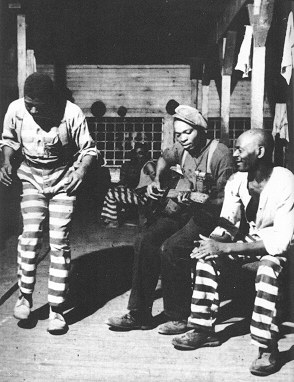 The power of the singing is part of what makes the question so vexing. If you listen to these songs all the way through, I guarantee some of the phrases and melodies won’t leave your mind anytime soon. You’ll find yourself waiting at a stop light or on a metro or bus and all of sudden some fragment will circle in your consciousness.
The power of the singing is part of what makes the question so vexing. If you listen to these songs all the way through, I guarantee some of the phrases and melodies won’t leave your mind anytime soon. You’ll find yourself waiting at a stop light or on a metro or bus and all of sudden some fragment will circle in your consciousness.
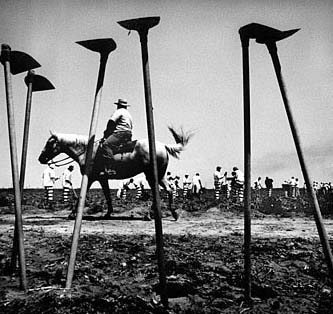 The purpose of these songs was to help one survive a neigh unbearable situation. It wasn’t just the hard work, it was also the utter injustice. To be born black, poor and male in the rural Jim Crow south was literally a likely sentence to hard labor.
But as we listen to the music something magical happens. Before we realize it, we are rocking in time to these work songs. Although these men are not entertainers; they are not trying to cut a hit record, nevertheless, the stark realness of this music verges on the mesmerizing.
The purpose of these songs was to help one survive a neigh unbearable situation. It wasn’t just the hard work, it was also the utter injustice. To be born black, poor and male in the rural Jim Crow south was literally a likely sentence to hard labor.
But as we listen to the music something magical happens. Before we realize it, we are rocking in time to these work songs. Although these men are not entertainers; they are not trying to cut a hit record, nevertheless, the stark realness of this music verges on the mesmerizing.
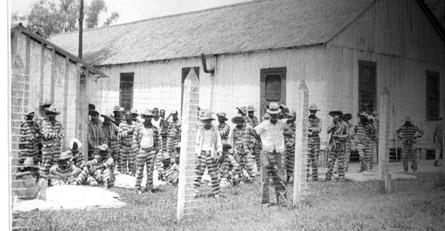 These prison recordings are the work of three men—Alan Lomax, Frederick Oster and Bruce Jackson. Lomax and Oster were committed to documenting folk music. Photographer and film maker Bruce Jackson recorded the Texas songs.
The bulk of these songs was recorded in the forties and fifties at the infamous Angola State Prison in Louisiana and at Parchman Prison in Mississippi. A handful of them come from the Texas recording in the 1960s.
The prison conditions were horrendous. In 1952, 31 inmates cut their Achilles tendons to protest the conditions at Angola. The majority of men sentenced to ten years or more at Angola ended up dying in prison. This is just a thumbnail sketch of the conditions under which these songs were recorded.
The history of black music in the United States is replete with social trouble and hardships rooted in extreme injustice—and though conditions are not as brutal today, the fact remains that slavery remains legal in America as provided for by the constitution which permits slavery in the case of convicts.
These prison recordings are the work of three men—Alan Lomax, Frederick Oster and Bruce Jackson. Lomax and Oster were committed to documenting folk music. Photographer and film maker Bruce Jackson recorded the Texas songs.
The bulk of these songs was recorded in the forties and fifties at the infamous Angola State Prison in Louisiana and at Parchman Prison in Mississippi. A handful of them come from the Texas recording in the 1960s.
The prison conditions were horrendous. In 1952, 31 inmates cut their Achilles tendons to protest the conditions at Angola. The majority of men sentenced to ten years or more at Angola ended up dying in prison. This is just a thumbnail sketch of the conditions under which these songs were recorded.
The history of black music in the United States is replete with social trouble and hardships rooted in extreme injustice—and though conditions are not as brutal today, the fact remains that slavery remains legal in America as provided for by the constitution which permits slavery in the case of convicts.
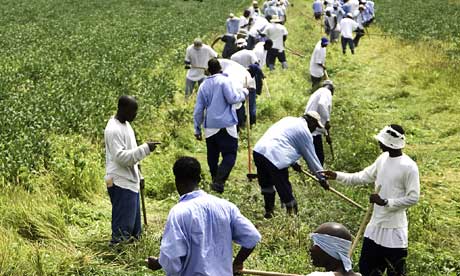 We may not still be singing work songs but black and poor communities are still subject to massive imprisonment. I leave to your own insights to make the connection between prison and music in the 21st century.
This week we are considering prison work songs from the Jim Crow period of the United States.
—Kalamu ya Salaam
Prison Work Songs Playlist
We may not still be singing work songs but black and poor communities are still subject to massive imprisonment. I leave to your own insights to make the connection between prison and music in the 21st century.
This week we are considering prison work songs from the Jim Crow period of the United States.
—Kalamu ya Salaam
Prison Work Songs Playlist
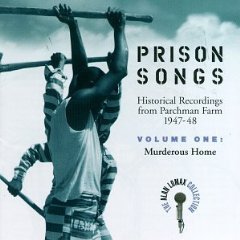 01 “Rosie” - Prison Songs - Prison Songs - Historical Recordings from Parchman
01 “Rosie” - Prison Songs - Prison Songs - Historical Recordings from Parchman
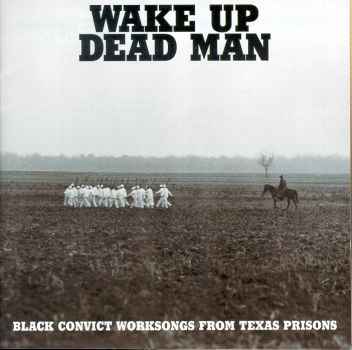 02 “Julie” - Wake Up Dead Man
02 “Julie” - Wake Up Dead Man
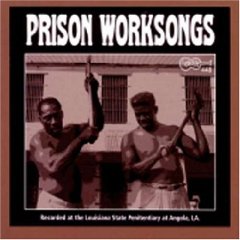 03 “Berta” - Angola Prison Worksongs
04 “Early In The Mornin' ” - Prison Songs - Historical Recordings from Parchman
05 “Log Lodging Talk, Yells, Chants” - Wake Up Dead Man
03 “Berta” - Angola Prison Worksongs
04 “Early In The Mornin' ” - Prison Songs - Historical Recordings from Parchman
05 “Log Lodging Talk, Yells, Chants” - Wake Up Dead Man
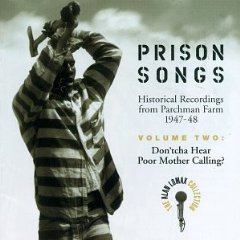 06 “John Henry” - Prison Songs, Vol. 2
07 “Hammer Ring” - Wake Up Dead Man
08 “Take This Hammer” - Angola Prison Worksongs
09 “How I Got In The Penitentiary” - Prison Songs - Historical Recordings from Parchman
10 “I Had Five Long Years” - Angola Prison Worksongs
11 "Stewball" - Angola Prison Worksongs
12 “I Got a Hurtin' in My Right Side” - Angola Prison Worksongs
13 “Early in the Mornin' ” - Angola Prison Worksongs
14 “Let Your Hammer Ring” - Angola Prison Worksongs
15 “Murder's Home” - Negro Prison Blues And Songs
16 “Working on the Levee, Pt. 2” - Angola Prison Worksongs
17 “It Makes A Long Time Man Feel Bad” - Prison Songs - Historical Recordings from Parchman
18 “Early in the Morning” - Wake Up Dead Man
19 “I'm in the Bottom” - Wake Up Dead Man
20 “No More, My Lawd” - Negro Prison Blues And Songs
21 “Old Alabama” - Prison Songs - Historical Recordings from Parchman
22 “What Makes A Work Song Leader?” - Prison Songs - Historical Recordings from Parchman
23 “Stewball” - Prison Songs, Vol. 2
24 “When I Went to Leland” - Prison Songs, Vol. 2
25 “I’m Goin' to Memphis” - Prison Songs, Vol. 2
06 “John Henry” - Prison Songs, Vol. 2
07 “Hammer Ring” - Wake Up Dead Man
08 “Take This Hammer” - Angola Prison Worksongs
09 “How I Got In The Penitentiary” - Prison Songs - Historical Recordings from Parchman
10 “I Had Five Long Years” - Angola Prison Worksongs
11 "Stewball" - Angola Prison Worksongs
12 “I Got a Hurtin' in My Right Side” - Angola Prison Worksongs
13 “Early in the Mornin' ” - Angola Prison Worksongs
14 “Let Your Hammer Ring” - Angola Prison Worksongs
15 “Murder's Home” - Negro Prison Blues And Songs
16 “Working on the Levee, Pt. 2” - Angola Prison Worksongs
17 “It Makes A Long Time Man Feel Bad” - Prison Songs - Historical Recordings from Parchman
18 “Early in the Morning” - Wake Up Dead Man
19 “I'm in the Bottom” - Wake Up Dead Man
20 “No More, My Lawd” - Negro Prison Blues And Songs
21 “Old Alabama” - Prison Songs - Historical Recordings from Parchman
22 “What Makes A Work Song Leader?” - Prison Songs - Historical Recordings from Parchman
23 “Stewball” - Prison Songs, Vol. 2
24 “When I Went to Leland” - Prison Songs, Vol. 2
25 “I’m Goin' to Memphis” - Prison Songs, Vol. 2
This entry was posted on Monday, November 16th, 2009 at 4:47 am and is filed under Classic. You can follow any responses to this entry through the RSS 2.0 feed. You can leave a response, or trackback from your own site.
2 Responses to “VARIOUS ARTISTS / “Prison Work Songs Mixtape””
November 17th, 2009 at 11:55 pm
As the above commenter said this is truly beautiful work, as well as being an important part of US history–so thank you for this collection. Part of the history of the US prison industrial complex in the US is the neo-slavery that occurred post Reconstruction. This documented in reporter Douglas Blackmon’s pulitzer prize winning, _Slavery By Another Name: The Re-Enslavement of Black Americans from the Civil War to World War II_ Blackmon document the false arrest, conviction and imprisonment of African Americans, mainly men, who were then “leased” to business to serve their indefinite sentences. Some of these businesses were farms and plantations, but more often were corporations such as US Steel. These men were held and made to work under appalling conditions, sometimes worked to death under “acceptable loss” policies of the times. For more info see Blackmon’s site (no, I’m not a relative or publicist) Thanks again for your wonderful work!
Leave a Reply
| top |